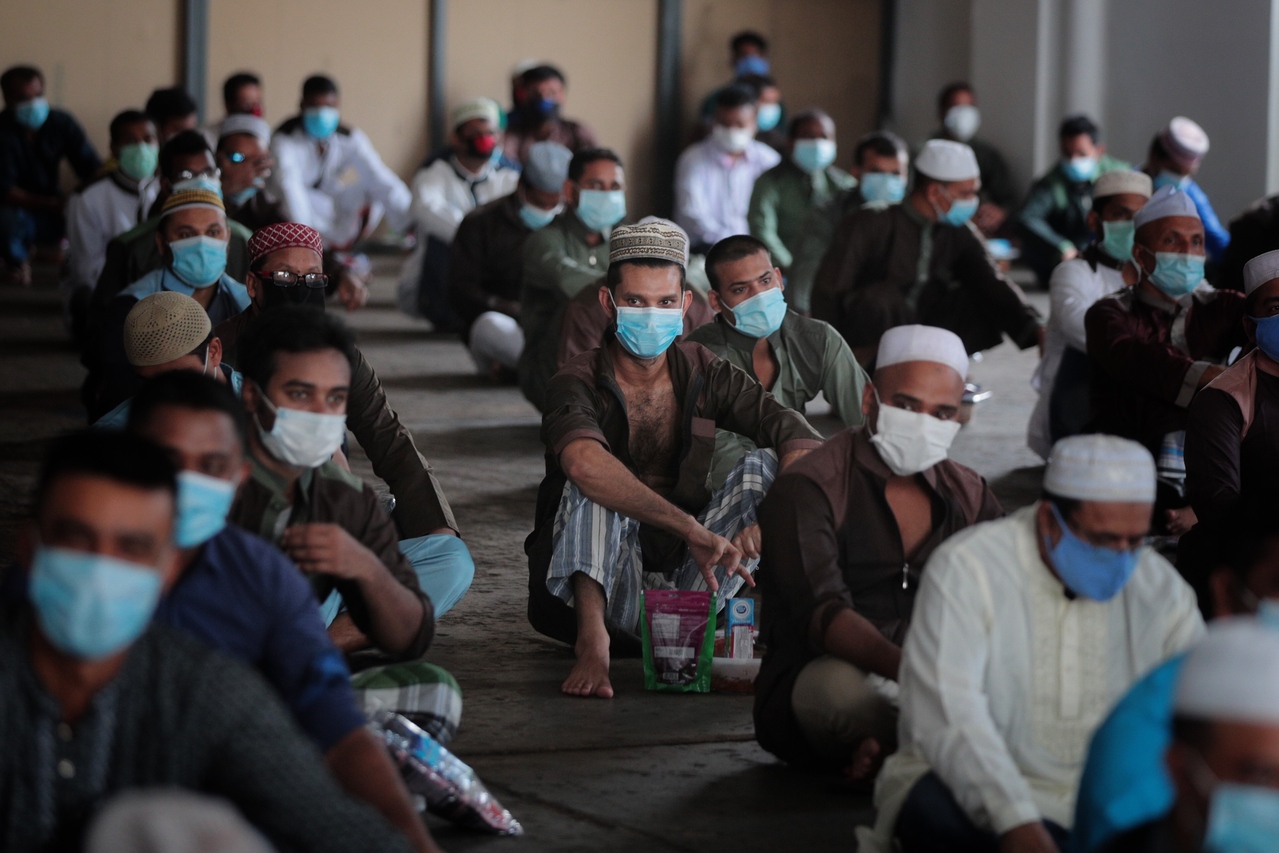COVID-19 SPECIAL
Workers hope for improved living spaces, safer transport
Sign up now: Get ST's newsletters delivered to your inbox

Migrant worker residents attend a Hari Raya Puasa event at Chinsim dormitory on May 24, 2020.
ST PHOTO: JASON QUAH
They came for a better life. Even if it meant staying in cramped spaces and being transported in open-backed lorries without seat belts.
The fact was, the migrant workers sometimes earned three times as much as they could have back home.
But now, they - and the nation - are relooking those conditions amid the high Covid-19 infection rate of those housed in dormitories.
Migrant workers The Straits Times spoke to said they hope their living spaces can be improved, with some citing space, washrooms and transportation in particular.
One of the most common suggestions among the 10 workers interviewed was to reduce the occupancy rate in dormitory rooms.
Mr Reaz Ahmed Bhuiyan, 31, a resident of Westlite Juniper located in Mandai, described his 16-man dormitory room as "very congested", and said he would prefer a 12-man room.
"Only one person can move in the gaps between our beds. It's difficult for two persons to move," he said.
Communal facilities like kitchens and washrooms can also be expanded or placed in more strategic locations, some workers added.
At the S11 dormitory in Punggol, workers often have to queue to use the centralised washrooms on every floor in the mornings, said resident Jasim Uddin, 31.
Kitchens are often packed in the evenings, as residents return home and cook at the same time, he added.
The site supervisor, who contracted the virus last month and is now recuperating in the Changi Exhibition Centre, also hopes workers can be ferried to their workplaces by buses instead of lorries.
"When I jam the brakes, everyone behind squeezes together, it's a chance for accidents to happen," said Mr Jasim. "Singapore is a First World country, but transporting workers by lorry (makes Singapore) look Third World."
However, most workers said it is difficult to pay more for better conditions, as every cent counts when remitting money home. Employers typically pay for their accommodation, but are allowed to deduct these costs from salaries.
Many also said conditions have improved over the years. Mr Panchadara Nagendra, 34, recalled how he stayed with 44 others a few years ago, in a dormitory room measuring 8m by 8m.
"The room smelled bad because workers dried wet clothes inside. Also, there were cockroaches and bed bugs," said Mr Nagendra, who now stays in Sungei Tengah Lodge in Choa Chu Kang, which can house 25,000 workers.
As with other purpose-built dormitories, his lodgings have facilities like a minimart, ATMs and remittance services.
"My dorm is like a small city. It has everything and we do not have to leave it to do chores on weekends," he said.
Some prefer it to staying with locals. Mr Omar Sakib, 33, a safety coordinator from Bangladesh, said he is comfortable in Sungei Tengah Lodge as he is surrounded by fellow foreign workers.
"If we gather in local areas, what if they don't really feel comfortable, what if people look down on me? Self-respect is very important for us in our culture," he said.
His friends have encountered Singaporeans who avoid them on trains or buses, but he believes most Singaporeans are well-mannered. "(Singapore) is a really beautiful, safe country," he said.
Workers said they have been overwhelmed by support from the Government, volunteers and companies.
Mr Bikramjit Singh, 32, said: "I read people saying (on the Internet) we are treated badly here. We are looked after better than my countrymen working in the Middle East. Over there, if there's a problem, they send workers home."
His sentiments were echoed by Mr Jasim. "The Government is caring for us. There is good support, so I have no reason to be scared."


